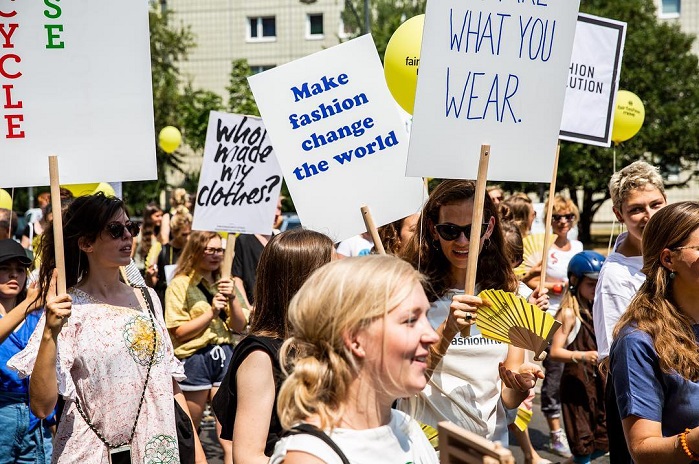Whilst Fashion Revolution gathers momentum by educating and encouraging consumers to ask #whomademyclothes?, behind the scenes, Director of Policy Sarah Ditty and her team work on rating some of the world’s biggest fashion brands and retailers according to how much they disclose about their social and environmental policies.
Carry Somers, Founder and Global Operations Manager at Fashion Revolution quotes John Keats when explaining the importance of transparency:
“Beauty is truth, truth is beauty, there is no beauty without truth and there is no truth without transparency.”
Where truth and transparency are one in the same, Somers and the team at Fashion Revolution are urgently rallying for fashion to take responsibility for its supply chains. Through campaigning for full disclosure of sourcing relationships, and educating consumers to ask the big questions of their favourite brands, Fashion Revolution is hopes to be a catalyst for fundamental change
What is the Fashion Transparency Index (FTI)?
The FTI ranks 200 of the biggest global fashion brands according to how much detail they publish about their supply chains, environmental policies, practices and social and environmental impact. Brands are assessed across 5 areas and monitored for improvement year upon year.
Since its formation in 2016, the FTI has encouraged brands to publish more information on their polices and practices. The FTI hopes to continue to encourage and support brands to make progress on human rights and sustainability.
Why is supply chain transparency important?
Vast global supply chains combined with the demands of fast fashion have nurtured a system of irresponsible subcontracting where standards have become invisible and the human rights of workers exploited and ignored.
Transparency in relation to fashion production is about clarity; creating tangible maps of where our clothes have come from. From the individuals who grow the raw materials, to those who stitched in the labels, companies must become accountable for the human lives that come into contact with their supply chains- and they must be scrupulous in achieving and maintaining good practice across all tiers of the supply chain.
For Fashion Revolution, transparency is the first step towards accountability; where there is accountability, there is the potential for fundamental change.
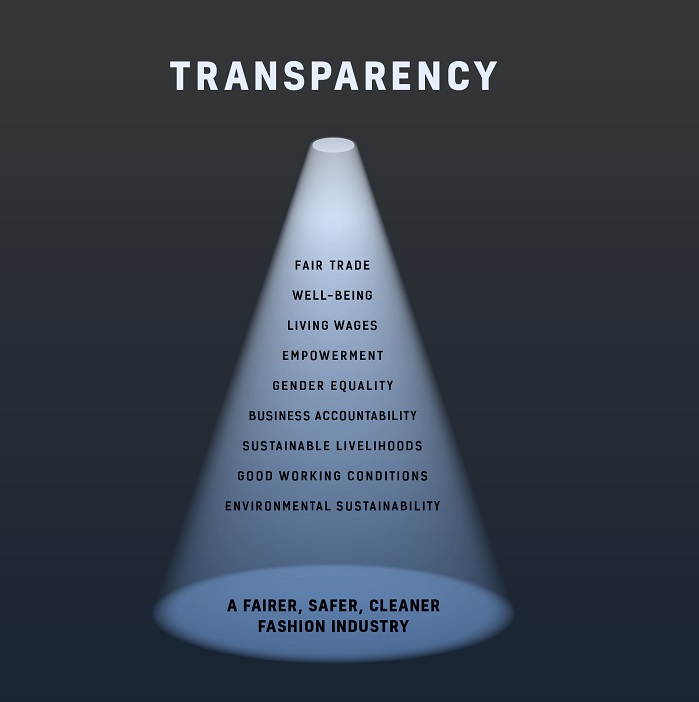
Whilst discussing the importance of transparency for the preservation of human rights at The FTI’s press release, Michael Beutler, Sustainability Operations Director at Kering Group touched on another imperative for transparency. He stated:
“Millennials like to affiliate with a brand that stands for something”.
This is the kind of approach that could convince board members to back new policies. Where brands fear that mapping their manufacturing could be detrimental to their sales, the realisation of the market potential of tapping into a belief system is an interesting imperative, which could drive sustainable practice whilst also stimulating business.
FTI 2019 results
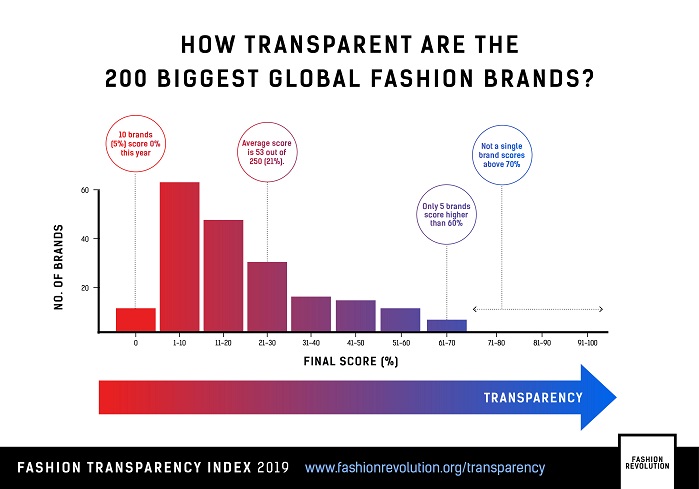
200 brands were assessed, all with an annual turn over of $500 million. Of the 200, only 46% actively participated. It was noted that brands which actively provide information are often the most receptive to change as they are openly working on developing their practices.
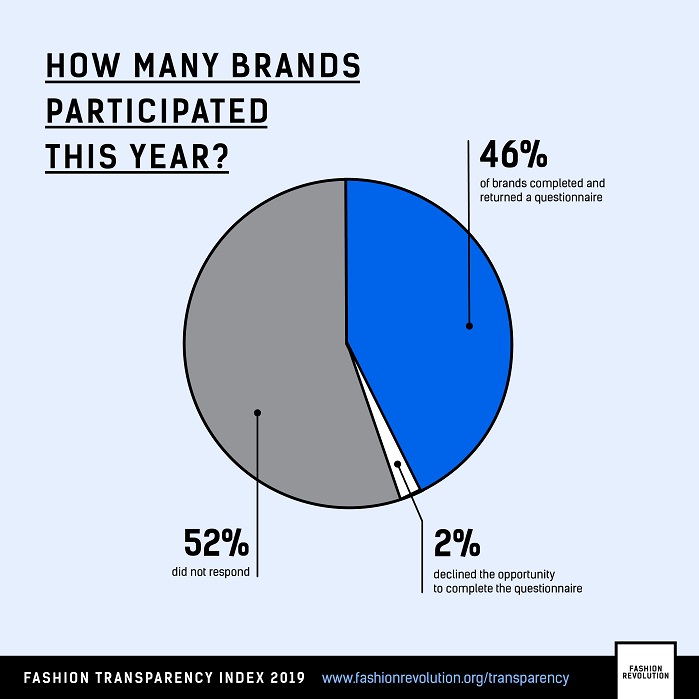
Scored out of a possible 250 points, only 5 of the brands reviewed scored zero, as opposed to 9 brands last year. The report makes clear which brands are on the ‘offenders list’
On the positive side, Dior was a notable improver, adding 22% to its score this year, with Nike and Sainsbury’s adding 21% to each of theirs.
Ranking seventh this year, Puma have been publishing a sustainability report since 2002, and have been disclosing their supply chain information since 2005. When asked whether there were any negative implications from sharing this information, Stefan Seidel, Head of Corporate Sustainability at Puma Group said there had been none. In fact, it was admitted throughout the industry panel during the press release that no companies had suffered due to their transparency.
Stefan spoke of the benefits of being honest about achievements and failures within the Puma supply chain, and honest about the systematic challenges the industry faces. Achieving third place in the 2018 FTI vs seventh for 2019, Stefan enthusiastically stated: “Rest assured, we will take on the challenge and ensure we rise up onto the podium again”. This sporting metaphor is encouraging. The FTI is not a competition, but a bi product of its publishing is that brands are encouraged to compare themselves and push one another. This bodes well for future improvements in policies and practice.
Emphasising the fact that human Rights are imperatives, not favours, Adil Rehman, Senior Ethical Trade Manager at ASOS did not shy away from the BBC panorama, which put ASOS and Marks and Spencer’s Under Scrutiny in 2016.
Adil explained that their fault lay in allowing there to be a lack of transparency within subcontracted work and taking responsibility for this had been an instigator for change. ASOS scored 59% for in this years FTI, up 9% from last year.
Who is the most transparent? “Sportswear and outdoor brands lead the way on transparency”
Addidas, Reebok and Patagonia, scoring 64% were the highest achieving brands this year, closely followed by Esprit and H&M. The ‘Biggest Movers’ this year were named as Dior, Sainsbury’s, Nike, New Balance and Marc Jacobs.
With an average score of only 12% in the Traceability section however, it is clear that there is still much to be done by brands to improve their communication about the methods they use, the relationships they have with suppliers and factories, and the impacts of their actions, both positive and negative.
70/200 of the brands are publishing their first-tier manufacturers publically, and 38 brands disclosed their processing facilities. Regardless of the reports of brands burning unsold stock last year, the FTI was surprised to find that only 26.5% of brands revealed their processes for pre consumer waste, and only 26% described the implementation of any circular solutions to reduce waste. The team at Fashion Revolution vow to continue to drive for change through the use of FTI.
How can brands provide continuous support to factories and maintain standards?
IndustriALL’s Director of Textiles and the Garment Industry Christina Hajagos-Clausen, explained why we need transparency, strong unions and clear sourcing guidelines. Christina spoke of how purchasing habits must change in order to instil and maintain working conditions that meet global standards for human rights.
When the fashion industry demands shorter lead times and frequent style changes, factories cannot remain supported, and standards are liable to slip in order to meet demands. She went on to explain that brands must respect factories and re assess their wholesale buying habits. Consumers must value what they have and purchase less.
In discussing the relationship between strong unions and good employers, Christina explained that brands that consistently support their supply chains and provide transparency are often the most receptive to remedying situations that do arise –another positive outcome of transparency.
Unpicking the challenges of shopping responsibly
The price of a garment is not a diagnostic factor for determining sustainable practice. Paying more in store does not directly reflect a fair wage to the workers who made the garment. With consumers unable to make assumptions based on cost or market level, and with many brands offering no information on their supply chains, it can become challenging to shop responsibly.
The opportunity to choose where to shop based on a belief system is arguably a privilege in itself – one that is not necessarily an option for individuals shopping with financial limitations.
It therefore seems that responsibility is shared between brands and consumers to make consumption more responsible. Where brands can improve their supply chains, educate consumers and increase transparency, consumers can respond by researching brands, purchasing less and asking #whomademyclothes?
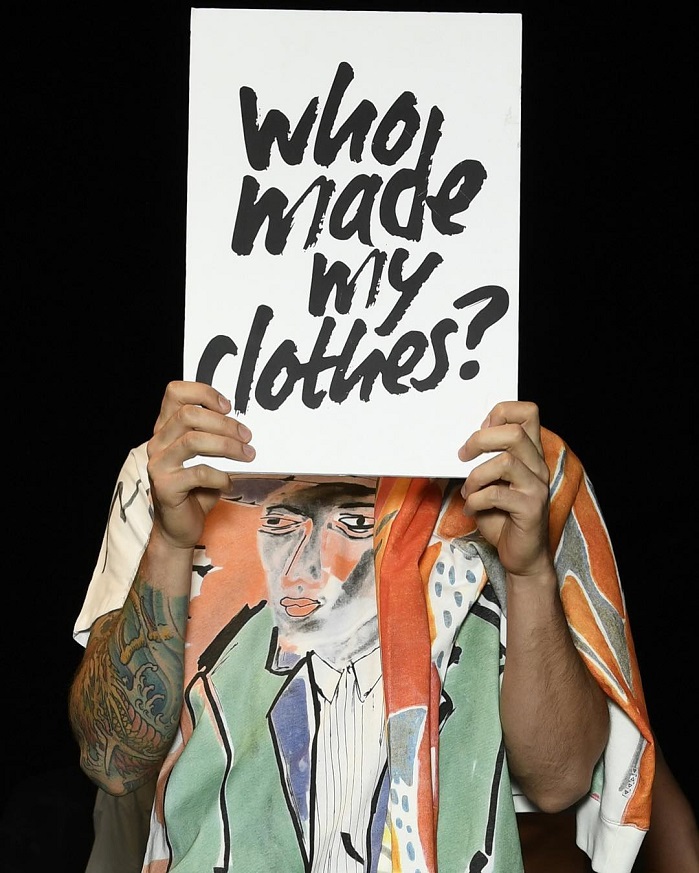
Want to take action? Here’s how!
Translating the FTI findings to all audiences is a challenge. This is where the Fashion Revolution Website, filled with resources, comes into its own. The website is a brilliant resource for supporting educators, students and consumers at all levels in developing their understanding of fashion supply chains and the human rights associated with them. Fashion Revolution equips anyone to challenge brands and question their practices.
Fashion Revolution provides information across market levels and does not discriminate. Their website educates and breaks down information about all the issues covered in the FTI.
For consumers who are unable to communicate their questions, or who are confused by the language from brands, Fashion Revolution provides a service of email templates.
This communicative tool enables those with or without industry specific knowledge to put pressure on brands to declare more and improve their practices.
The message from The Fashion Transparency Index 2019 is one of gradual yet positive change. In 2020s Index, it would be brilliant to see more brand participation, further development in circular solutions, and continued rising scores across the board.
It is encouraging to see organisations such as Fashion Revolution are offering support to brands and consumers alike, as they vow to continue challenging and supporting brands to become more transparent and clean up the fashion industry.
To read the full 2019 Fashion Transparency Index and join the Fashion Revolution, visit www.fashionrevolution.org

Subscribe To Our Newsletter
Join our mailing list to receive the latest news and updates from our team.


